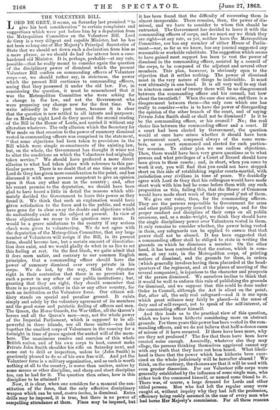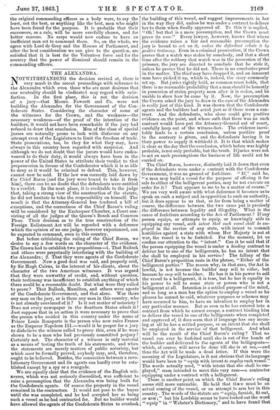THE VOLUNTEER BILL. L ORD DE GREY, it seems, on Saturday
last promised "to give his best consideration" to certain complaints and suggestions which were put before him by a deputation from the Metropolitan Committee on the Volunteer Bill. Lord de Grey is a very diligent and capable Minister, but he has not been so long one of Her Majesty's Principal Secretaries of State that we should set down such a declaration from him as mere phrase, as we should do had the utterer been a case- hardened old Minister. It is, perhaps, probable--at any rate, possible—that he really meant to consider again the question of the disciplinary power of dismissal which the present Volunteer Bill confers on commanding officers of Volunteer corps —or, we should rather say, in strictness, the power which the present Bill continues to commanding officers, seeing that they possessed it under the old law. For, in considering the question, it must be remembered that it was the Metropolitan Committee who were asking for a change in the law, and not the Government who were proposing any change now for the first time. We write advisedly in the past tense, because it is clear that the question is now settled to all intents and purposes; for on Monday night Lord de Grey moved the second reading . of the Bill in the House of Lords, and carried it without any alteration whatever. The only allusion which the Secretary for War made on that occasion to the power of summary dismissal vested in commanding officers was comprised in the statement, "that some objections had been taken to provisions in the Bill which were simple re-enactments of the existing law, but, on the whole, the Government has thought it wiser not to alter the conditions on which the Volunteers had originally taken service." We .should have preferred a more direct allusion to what had taken place with reference to this par- ticular power. There is no doubt that at one time or another Lord de Grey has given more consideration to the point, and has discussed it with more persons competent to give an opinion upon it than any other man in the country ; and, after his recent promise to the deputation, we should have been lad to have heard a little in detail the reasons which ulti- mately decided the Government to leave this power as they found it. We think that such an explanation would have given satisfaction to the force and to the public, and would have gone far to clear away the doubts and objections which do undoubtedly exist on the subject at present. In view of these objections we recur to the question once more. It would be a grave misfortune to the country if any serious check were given to volunteering. We do not agree with the deputation of the Metropolitan Committee, that any large number of Volunteers will resign if the Bill, in its present form, should become law, but a certain amount of dissatisfac- tion does exist, and we would gladly do what in us lies to set this feeling at rest. On the first blush, we quite admit that it does seem unfair, and contrary to our common English principles, that a commanding officer should have the power of summary dismissal over every private in his corps. We do not, by the way, think the objectors right in their contention that there is no precedent for such a power in any other of our public institutions ; but, granting that they are right, they should remember that there is no precedent, either in this or any other country, for such an institution as the Volunteer force. Our citizen sol- diery stands on special and peculiar ground. It exists simply and solely by the voluntary agreement of its members and the good sense and patriotic feeling of officers and men. The Queen, the Horse Guards, the War Office, all the Queen's horses and all the Queen's men—nay, not the whole power of the Imperial Parliament, which is supposecl. to be all- powerful in these islands, nor all these united—can hold together the smallest corps of Volunteers in the country for a fortnight in time of peace against the united will of the mem- bers: The unanimous resolve and coercion of this whole British nation, and of his own corps to boot, cannot make Private John Smith shoulder his rifle on Saturday next, and come out to drill or inspection, unless he (John Smith) is graciously pleased to do so of his own freewill. And yet the Volunteer force is a military organization, and as such is worth nothing at all to the country, is worse than useless, unless by some means or other discipline, and sharp and short discipline too, can be had for it. The question then arises, how is this discipline to be attained ?
Now, it is clear, when one considers for a moment the con- stitution of the force, that the only effective disciplinary weapon which can be used, contra invites, is dismissal. Extra drills may be imposed, it is true, but there is no power of compelling attendance at them. Fines may be imposed, but it has been found that the difficulty of recovering them is almost insuperable. There remains, then, the power of dis- missal, and we have to consider to whom this should be.
entrusted. The Government has decided to leave it with the commanding officers of corps, and we must say we think they are right—at any rate, as yet-, neither have the Metropolitan Committee, nor has any member of either House of Parlia- ment—nor, so far as we know, has any journal suggested any reasonable or workable substitute. The suggestion which seems to have gained most support has been to vest the power of dismissal in the commanding officer, assisted by a council of the corps, to be composed of the adjutant and several other members. This plan, however, is obviously open to the objection that it settles nothing. The power of dismissal must in the very nature of things be indivisible. It must vest ultimately in one hand. It is all very well to say that in nineteen cases out of twenty there will be no disagreement between the commanding officer and his council, but how about the twentieth? When the case does arise, and there is n disagreement between them—the only case which one has really to consider—who is to have the power of disregarding the opinion of the other branch of the court, and of saying: Private John Smith shall or shall not be dismissed? Is it to be the commanding officer, or his council ? No; the real choice lies between the commanding officer and a court. If a court had been elected by Government, the question would at once have arisen whether it should have been a permanent court, composed always of the same mem- bers, or a court summoned and elected for each particu- lar occasion. To either plan we see endless objections. Then, there would have been very grave questions as to what powers and what privileges of a Court of Record should have- been given to these courts ; and, in. short, when you come to work it out, you will find that you could not have stopped short on this side of establishing regular courts-martial, with jurisdiction over civilians in time of peace. We decidedly agree with Lord de Grey that his colleagues would have made short work with him had he come before them with any such. proposition as this, failing this, that the House of Commons would have made short work of their proposal if not of them..
We give our voice, then, for the commanding officers. They axe the persons responsible to Government for arms and other public property issued to their corps, and for the- proper conduct and discipline of their corps on all public occasions, and, as a make-weight, we think they should have- the single disciplinary power over Volunteers vested in them. It only remains to consider whether, the power being vested in them, any safeguards can be applied to ensure that that power shall not be abused. It has been suggested that a commanding officer shall be obliged to state in writing the grounds on which he dismisses a member. On the other hand, it has been contended that the custom, which is com- mon, at any rate, in the Metropolitan corps, of printing notices of dismissal, and the grounds for them, in orders (which generally involves having them placarded at the head- quarters of the regiment, and at the places of meeting of the- several companies), is injurious to the character and prospects. ofthe person dismissed. We ourselves incline to think that it would be well to enforce this rule of publishing the grounds for dismissal, and we suppose that this could be done under- Order in Council, although the Act is silent on the point.. But, after all, the only real safeguard—and it is one uponi which great reliance may fairly be placed—is the sense of duty and of self-respect, not to speak of the self-interest, of the commanding officer himself.
And this leads us to the practical view of this question,. which we have been hitherto considering more on abstract grounds. For three years this power has been vested in the com- manding officers, and we do not believe that half-a-dozen cases of misuse of it have occurred. If there have been more, why. are they not produced ? The few that there have been have created noise enough. Assuredly, whatever else they may allege, the persons thinking themselves aggrieved cannot say with any truth that they have not been heard. What likeli- hood is there that the power which has hitherto been exer- cised on the whole judiciously will be hereafter abused ? We think, on the contrary, the chances are that it will be used with. even greater discretion. For our Volunteer rifle corps were. generally established by the influence of some single man, who either took the command himself, or named some friend to it. There was, of course, a large demand for Lords and other titled persons. Men who had left the regular army were caught at, without inquiry why they had left the profession, efficiency being rashly assumed in the case of every man who had borne Her Majesty's commission. For all these reasons. the original commanding officers as a body were, to say the least, not the best, or anything like the best, men who might have been found for the purpose. It is probable that their successors, as a rule, will be more carefully chosen, and for better reasons. No corps would now endure to have an inefficient man set to command them. So, on the whole, we agree with Lord de Grey and the Houses of Parliament, and after the best consideration we can give to the question, are satisfied that it is best for the Volunteer force and for the country that the power of dismissal should remain in the commanding officers.































 Previous page
Previous page